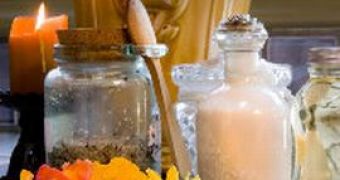Even if aromatherapy is an ancient practice which was proved to be very efficient in easing symptoms of a wide range of disorders, skeptics claim that the complementary therapy based on essential oils fragrance and its potency to improve health disorders is nothing but a fraud and it also may have more side-effects than beneficial ones.
Aromatherapy with essential oils (plant extracts) functions by adding the sweet, relaxing or energizing flavored oils to baths, massage lotions or infusions or by simply massaging the scalp and temples before sleeping with a few drops of oils. The most used oil extracts in aromatherapy are those of bergamot, cypress, geranium, jasmine, lavender, melissa, rose, and ylang-ylang.
One of the most ardent critics of the flavor-based complementary therapy, Dr. Stephen Barrett, Board Chairman of Quackwatch Inc., an Allentown, Pa.-based organization said that it shouldn't even be categorized as a therapy: "It's not a therapy, it's a set of products with odors. If people like the odors and want to pay for them, I would have no objection."
He also added that there is no clear evidence up to present to sustain the beneficial effects aromatherapy has on human health. Moreover, the practice may have many side-effects on people who resort to it to treat one disorder or the other, as the fragrance of essential oils may be irritating: "There is no evidence that aromatherapy can alter the course of any disease. There is no logical reason to believe that any such evidence will ever be found. Some people find certain odors irritating. People who use aromatherapy with the hope that it will cure what ails them will waste money."
On the other hand, there are the aromatherapy's defenders, who state that it is a very convenient, inexpensive, drug-free way of treating emotional disorders by using relaxing essential oils or energizing people who suffer from fatigue-related disorders. Kelly Holland Azzaro, a registered Aromatherapist in Banner Elk, N.C., and Vice President of the National Association for Holistic Aromatherapy (NAHA) stressed that the flavor - based therapy "works for so many different things, it is amazing."
The aromatherapist described how the practice works: "You can experience aromatherapy by inhalation by putting one drop of an essential oil on a tissue and inhaling." For instance, peppermint, ginger or orange essential oils are very efficient against nausea. The expert also advises: "Uplifting scents such as citrus can keep you awake at work. To help increase alertness, use rosemary and lemon."

 14 DAY TRIAL //
14 DAY TRIAL //